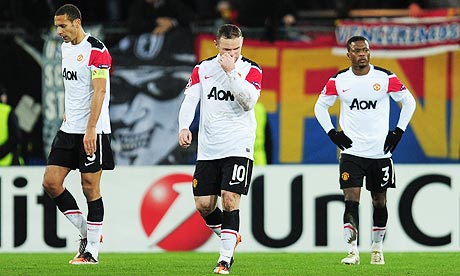
While Manchester grieves over the failure of United and City to reach the knockout stage of the Champions League, for the rest of Europe life goes on. To some eyes the tournament may now appear diminished by the absence of the Premier League's two leading teams but the reality is that for all the qualities of organisation, resilience and sheer doggedness that English sides have brought to the world's most prestigious club competition, appearing in six of the past seven finals, few if any have stamped it with the imprint of lasting greatness.
Of course that could change. Chelsea's enduring warhorse, Didier Drogba, may bring the trophy to Stamford Bridge with one last burst of inspiration, or Robin van Persie could win it for Arsenal. It is more likely, however, that Barcelona or Real Madrid will maintain the reign of Spain.
Any relief felt by rivals at the departure of Manchester United, finalists in three out of four seasons, plus a certain amount of schadenfreude at Manchester City's failure, so far, to buy a quick route to Champions League success will have had little to do with allaying fears that they were going to be outclassed by either team. United's recent performances in Europe have been meek, apologetic almost, while City, for all their prowess back home, imploded in Munich and Naples.
Statistically the overall record of English clubs at this level is impressive. Between 1977 and 1984 the European Cup left England for only one season. Since then Manchester United have won the Champions League twice, Liverpool once. Yet no team from this country have ever captured the imagination of the football world in the manner of Real Madrid in the early years, Ajax and Bayern Munich in the 70s, Milan in the 80s and 90s or Barcelona in the new century.
In 1968 Matt Busby's United became the first English club to win the European Cup when they beat Benfica 4-1 on a memorable night at Wembley. But United only produced memorable football in extra time, when George Best started to do his stuff.
The best of Liverpool's five successes was their first, in 1977, when they beat Borussia Mönchengladbach 3-1 in Rome, Bob Paisley having misled the opposition tactically by hinting that a stricken John Toshack would be able to play. Of course he did not and Liverpool, having learned the importance of patience and possession under Paisley while retaining the passion of Bill Shankly's sides, won with something to spare. It was good but not that good.
The wonder of Brian Clough's Nottingham Forest winning the European Cup in 1979 and 1980 was not that they did it particularly well but that they did it at all. The ESPN Classic channel recently reran the 1982 final in Rotterdam, in which Aston Villa beat Bayern Munich courtesy of a toe‑poke from Peter Withe. At the time the football looked a bit indifferent, now it comes across as a dreary, plodding mishmash of poor passing and inferior technique.
The most memorable of the Champions League finals involving English teams must be Liverpool's astonishing recovery, led by Steven Gerrard, to take the game to a triumphant shoot-out in Istanbul in 2005, after Rafael Benítez's cack‑handed selection had helped a Milan side inspired by Kaká and the amount of room he was given to take a 3-0 lead. Even then the drama left a deeper impression than the quality of the football.
At least Manchester United are spared the possibility of another drubbing by Barcelona somewhere along the way. Manchester City, still an expensive work in progress, may in future find themselves well-placed to show their neighbours how it should be done and it is a pity that players of the quality of David Silva and Sergio Agüero are for the moment confined to the Europa League, always assuming City want to field full‑strength teams on Thursdays.
Arsenal might have remained in a position to offer European football a new art form had they been able to keep Cesc Fábregas and Samir Nasri. Now they may be as concerned with reaching next season's Champions League as winning the present tournament.
Perhaps this is why the leading multinational Premier League teams consistently come off second-best in the game's beauty contests. They spend so much time in overalls, scrapping for points and a top-four finish, that they find it hard to change into evening dress for the big occasions.

